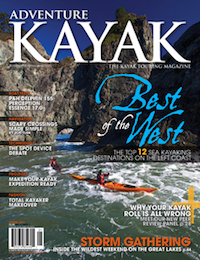I’m frequently astounded by some of the sea kayak techniques that make their way into books and magazines, get talked about at symposiums and are taught by self-proclaimed instructors. Some are unlikely to work in real world situations; the worst can be damaging to your body.
Flipping through a well-thumbed copy of Living Canoeing (Redwood Press Limited, 1969) recently, I found an illustration of towing technique that suggested the rescuer secure the towline by wrapping it around his bicep and gripping the end in his teeth.
If this technique were published today in a magazine how-to article, how would readers decide whether this is current and best practice?
We need true experts in our field to referee and filter out the bad information. It is time to raise the bar. There is a lot of good information out there, supported by science, and we have experts who can safely and supportively advance us. I am personally indebted to these experts for the paddler that I am today.
Experienced does not, by default, mean expert. My mother had over 60 years experience driving a car, but I would not go to her to teach me how to drive. Experienced just means time behind the wheel or in the cockpit. An expert combines this with a devotion to ensuring this is time spent developing best practices, not bad habits.
Peer review advances new ideas and methods and moves the sport forward at a faster rate.
What defines an expert in paddlesports? Experts have extensive experience paddling in a wide range of conditions and environments, experimenting with various techniques and diverse equipment. Experts also understand complex and variable outdoor environments— weather, wind, currents, sea state, surf, etc; body biomechanics; equipment design and how all of these relate to technique.
An expert’s information is current practice, works in real world conditions and is effective and efficient. And it is accepted by others of equal standing in the paddlesports community.
Reckless experimentation and fresh ideas from paddlers new to the sport drive innovation, but when these ideas are presented for public consumption, there is a greater responsibility to the paddling community. The best approach to meeting this responsibility is the process of peer review by a panel of experts.
Peer review is one of the most powerful tools we have to maintain standards and make sure that disseminated information is current and worthwhile. Peer review advances new ideas and methods and moves the sport forward at a faster rate.
No expert is outside the process and all reviews are open to the public. Strongly held beliefs must be held loosely so that as new information and evidence streams in, opinions can change and those who are resistant are removed from their pedestals.
Leon Somme is the co-founder of Body Boat Blade International, an award-winning kayak school located on Orcas Island, WA. Leon is a BCU Level 5 Coach aspirant, holds BCU awards in sea, surf, whitewater and open canoe and is an expert for Adventure Kayak’s new, peer-reviewed technique column.




